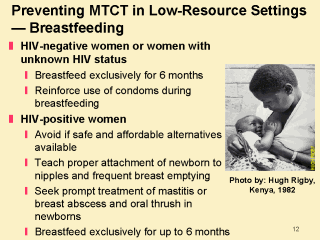 |
Breastfeeding
carries significant risks of mother-to-child transmission, especially in mothers newly
infected during pregnancy or postpartum. In fact, breastfeeding may account for over 50%
of new pediatric HIV cases globally each year. Women who are HIV-uninfected or whose HIV
status is unknown should exclusively breastfeed their newborns for 6 months to reduce the
morbidity and mortality from diarrheal, respiratory and other infections associated with
not breastfeeding. At the same time, the use of safer sexual practices, including
consistent condom use, should be reinforced during lactation to prevent maternal primary
HIV infection. In women with acute HIV infection who breastfeed, there is approximately
29% risk of transmission to the newborn. In women who are HIV-infected, breastfeeding
should be avoided if safe and affordable alternatives are available. However, in many
areas with limited-resources, there are no good alternatives to breastfeeding and avoiding
breastfeeding altogether will be associated with increased rates of non-HIV related infant
illness and death and increased stigma for the mother. There has been increased attention
to specific risk factors for HIV transmission associated with breastfeeding and
incorporation of this information to help reduce risk when breastfeeding is desired. All
new mothers should be taught how to breast feed properly and to seek prompt treatment if
they develop a possible breast infection, breast sores or cracked nipples or if their
infant develops oral lesions, such as thrush. Because of recent studies showing an
increased risk of transmission associated with mixed breast and non-breast feeding, and
because risk of transmission increases with duration of breastfeeding, current
recommendations call for exclusive breastfeeding for up to 6 months with rapid weaning and
transition to replacement feeds. |
